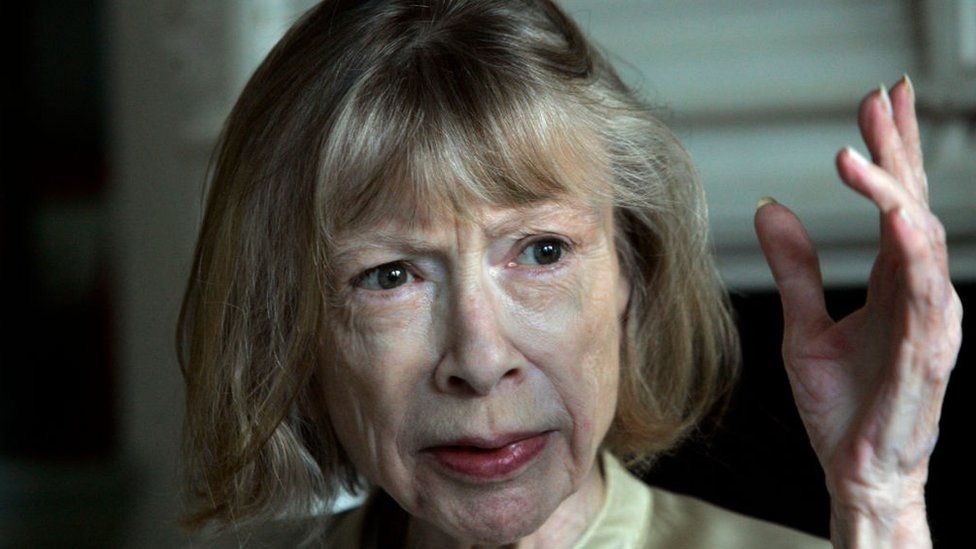Joan Didion: US literary icon dies at 87
- Published

Joan Didion, a literary icon who chronicled 60s and 70s US culture, with screenwriting credits including 1976 film A Star Is Born, has died aged 87.
The incisive US novelist and essayist examined the fragmentation of US life in books like 1968's Slouching Towards Bethlehem and 1979's The White Album.
Her Pulitzer Prize-winning The Year of Magical Thinking mined her own grief following the death of her husband.
She died of Parkinson's disease, her publisher, Knopf, told the BBC.
"We tell ourselves stories in order to live," Didion once wrote, and she spoke of the act of writing more astutely than perhaps anyone else.
She was revered by legions of young and aspiring writers for her cool, terse and distinctive voice.
"No one writes better English prose than Joan Didion," wrote literary critic John Leonard, who once described Didion's prose as "ice pick laser beams".
Didion was said to be fiercely protective of her work, not letting on about the latest subject of interest to her closest friends until it was ready to publish.
She received the National Medal of Arts in 2013 from US President Barack Obama, who described her at the time as "one of the most celebrated American writers of her generation" and "one of our sharpest and most respected observers of American politics and culture".
"I wanted not a window on the world but the world itself," she wrote in her essay collection Let Me Tell You What I Mean, published this year.
Her literary bona fides were unaffected by a growing pop-culture fascination, including advertising campaigns with both Gap (in 1989) and Celine (in 2015).
Born in Sacramento in 1934, a fifth-generation Californian, she studied at the University of California, Berkeley. Didion joined Vogue Magazine after graduation in 1956, leading to her career as a journalist and writer.
Her novels included 1970's Play It as It Lays, which explored and exposed Hollywood film culture. Fellow author Martin Amis once described her as a "poet of the Great Californian Emptiness".
She also adapted The Year of Magical Thinking, her wrenching, ruminative and award-winning account of losing husband John Gregory Dunne, for the stage. Vanessa Redgrave starred in the inaugural production on Broadway in 2007.
Also that year, Didion was awarded the National Book Foundation's Medal for Distinguished Contribution to American Letters "for her distinctive blend of spare, elegant prose and fierce intelligence".
She became a leading exponent of the mostly male New Journalism movement, standing alongside Tom Wolfe, Truman Capote and Gay Talese.
In 2005, grief became an unwanted inspiration again after her adopted daughter Quintana Roo died of acute pancreatitis at the age of 39. Didion channelled her loss into the 2011 memoir Blue Nights.
Shelley Wagner, her editor at Knopf, said Didion had been "a wise and subtle teller of truths".
"We will mourn her death but celebrate her life, knowing that her work will inspire generations of readers and writers to come," Ms Wagner added.
Didion suffered the deaths of her husband and daughter, Quintana Roo Dunne, within two years of each other